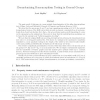Free Online Productivity Tools
i2Speak
i2Symbol
i2OCR
iTex2Img
iWeb2Print
iWeb2Shot
i2Type
iPdf2Split
iPdf2Merge
i2Bopomofo
i2Arabic
i2Style
i2Image
i2PDF
iLatex2Rtf
Sci2ools
130
click to vote
STOC
2004
ACM
2004
ACM
Derandomizing homomorphism testing in general groups
The main result of this paper is a near-optimal derandomization of the affine homomorphism test of Blum, Luby and Rubinfeld (Journal of Computer and System Sciences, 1993). We show that for any groups G and , and any expanding generating set S of G, the natural deramdomized version of the BLR test in which we pick an element x randomly from G and y randomly from S and test whether f(x)?f(y) = f(x?y), performs nearly as well (depending of course on the expansion) as the original test. Moreover we show that the underlying homomorphism can be found by the natural local "belief propagation decoding". We note that the original BLR test uses 2 log2 |G| random bits, whereas the derandomized test uses only (1 + o(1)) log2 |G| random bits. This factor of 2 savings in the randomness complexity translates to a near quadratic savings in the length of the tables in the related locally testable codes (and possibly probabilistically checkable proofs which may use them). Our result is a sig...
Algorithms | Belief Propagation Decoding | Simple Combinatorial Arguments | STOC 2004 | |G| Random Bits |
Related Content
| Added | 03 Dec 2009 |
| Updated | 03 Dec 2009 |
| Type | Conference |
| Year | 2004 |
| Where | STOC |
| Authors | Amir Shpilka, Avi Wigderson |
Comments (0)

